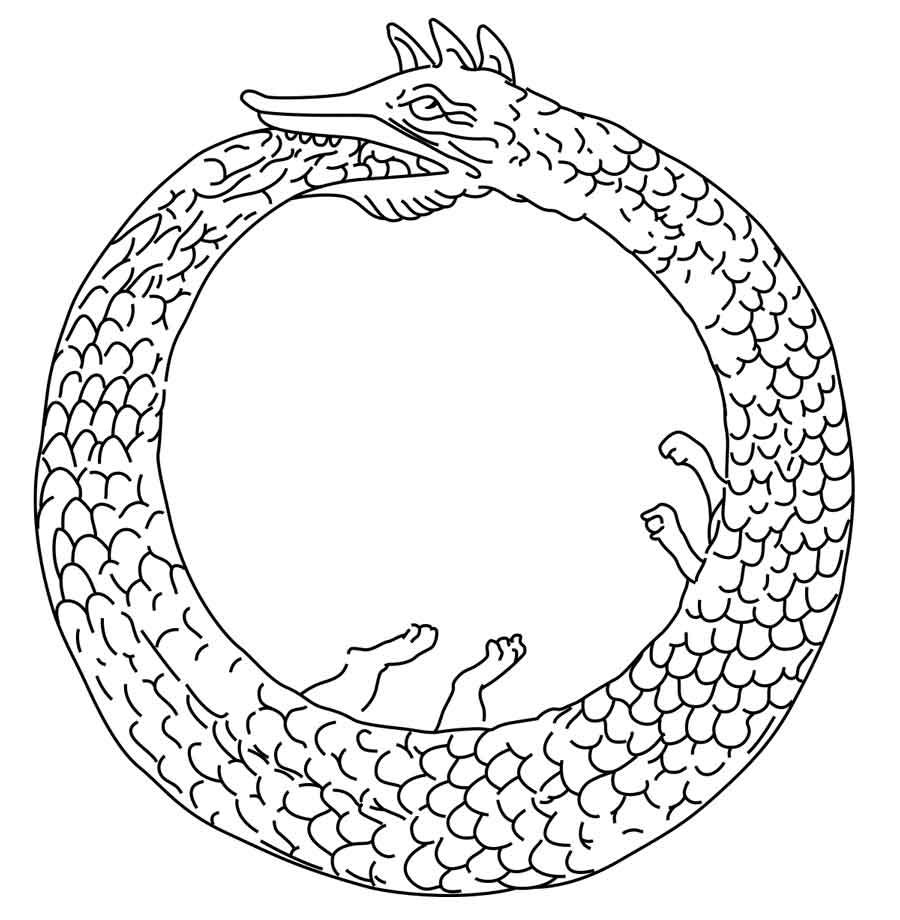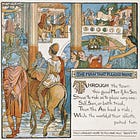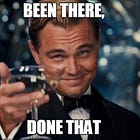🤥 My Most Toxic Trait, Part Two
Perhaps it’s because my livelihood is tied in part to my likability; the widget I’m producing when publishing personal essays is myself.
This post has a soundtrack . . . from the 1999 teen rom-com 10 Things I Hate About You. Catch up on part one first:
“If we feel compelled to write, why is it so dang hard to do it?
I have grappled with this question all of my writing life, and have thought deeply about it. Maybe it’s a sign that I shouldn’t be a writer. It being hard is not in opposition to my ability or desire to write, and it doesn’t actually deplete from my writing, it contributes to it. It forces me, even in persisting, to do two or three of those ingredients of good writing.
Should I go to therapy to purge this feeling? Would I be a better writer if I sat down and said, ‘You’re so wonderful Cheryl . . . ’
[PAUSE]
I would be an insufferable bitch and you wouldn’t want to read anything I wrote.”
—Cheryl Strayed at Omega’s Wild Awakenings workshop
True to form, after hitting publish on part one, I spent the rest of the day spiraling. I felt like my nerves were exposed, zinged at random intervals with thoughts about how neurotic and negative I sounded—was that the post finally indicating this whole writing project has gone bust? I couldn’t bear to open Gmail until the following morning—I wasn’t ready to see any reactions, and I wouldn’t have the willpower to skip over any “new comment” subject lines.
Finally, at five a.m. the following morning, face lit only by the foreboding phone screen, I gulped and steadied myself to see if any comments had rolled in, preemptively flinching. With a lump forming in my throat, I clicked on Substack’s tiny bell icon.
Two comments. Encouraging words from Maghan Haggerty and Paul Millerd. With their powers unknowingly combined, they cranked the pressure valve in my chest left, releasing all that pent-up anxiety air. Then, this morning, as my worries re-accumulated while editing this installment, I spot three more refueling notes from longtime friends, Dr Susan Biali Haas MD, Clare Egan, and Kyle Wood.
This is too much pressure to put on you, my dear readers, and on myself. What a terrible waste of life force. What does it matter if one person—or to take the thought-exercise to its extreme—every single person hates a post? Or perhaps worse, feels nothing about it? How self-obsessed am I?! The world is on fire! And I’m worried about whether you like me?! I mean, really. GET A CLUE.
Perhaps it’s because my livelihood is tied in part to my likability; the widget I’m producing when publishing personal essays is myself.
With that, let’s continue where we left off . . .
🙄 10 Things I Hate About (Wanting to Be Liked By) You
An abridged version of reasons one through five:
It’s a lie—and it’s lying.
It makes me anxious before, during, and after publishing (including this post).
This, in turn, pressures me to publish an escalating level of “bangers.”
It’s boring.
It’s sticky, like fly paper.
Wanting to be liked is antithetical to the personal essay process, where as Sarah Fay teaches, “You can win, but only at a cost. Or you can lose, that works too.” Unlike my former genre of writing nonfiction business and career books, what an essayist can’t do is brag (humble or otherwise) or pretend to know everything. I grew weary, anyway, from the self-imposed pressure to be an End-All Be-All Expert.
It’s stifling. However many spin cycles I spend wanting to be liked prevents me from living my life fully. Are you mad at me? I obsess over this, and I also worry that my ineptitude at keeping up with communication causes others in my life to worry in the reverse. (There’s my codependency again: I am worried that you might be worried that I don’t respect you—but I do, I am just truly abysmal at inboxes).1 It’s like a screen covering a window overlooking an exquisite garden—you can see, but the view is rendered with a smoggy tint.
It’s impossible. Striving to be liked is an impossible, Sisyphean goal. Not everyone will like you (or me) and that has to be okay! Tell it to my amygdala. Oprah says one of her biggest life lessons has been realizing she doesn’t want to be called nice—that is an insult. Kind, maybe, but not nice. Nice is performative, external behavior that prioritizes avoiding conflict; it’s for people who don’t stand up for themselves. Kindness requires boundaries; it is rooted in authenticity, telling the truth out of respect for yourself and others. This has been her greatest lesson, and the one that took her the longest to learn. “I used to be spread so thin, there wasn’t room in my life for me,” she said. “It is the thing to conquer in my life, and it still shows up constantly.”2
It’s an unnecessary burden, especially when my desire to be liked gets in the way of setting boundaries or saying no. Even when wronged, I suppress anger, looking for ways to take full responsibility for the situation. I watch with fascination at the way (some) sociopaths steamroll anyone in their way, lying or manipulating ad nauseam to achieve their selfish agenda. I’m not saying I want myself or others to live this way, but it’s no wonder so many of these types go on to become dictators, presidents, and tech oligarchs. Unfortunately for the world, there’s no overabundance of empathy or people-pleasing weighing them down.3
It’s phony. Instead of giving you—and me—permission to be who we really are, it suds up the window until you can barely see inside (yes, the metaphor is now officially tortured as we have a screen and a sudsy film covering the self). I might feel safe, but I’m hiding from you, from your projected judgment, and from my own imperfections. Paradoxically, this only reinforces the fear that I’m not ______ enough to ______. As the Chinese proverb goes, one must learn to wear slippers rather than attempt to carpet the world.4
Is wanting to be liked and telling the truth inherently contradictory?
Couldn’t telling the uglier truth make one more likable, in a counterintuitive way? Maybe, but I hate to even ask the question. Why not just tell the truth, warts and all, and let the judgment cards fall where they may?
I admire those who say what they really think and what they stand for, especially when it cuts against what’s popular or accepted by their community. Part of me is afraid I have too much to lose; unlike those with large platforms that will follow them anywhere (and/or large bank accounts to fund a mass exodus), I do feel vulnerable to being cast aside, castigated, or otherwise cancelled (yes, I’m even self-conscious that the word itself is offensive to some).
As Cheryl Strayed recounted in her two-part podcast conversation with Oprah, “What I’ve come to realize is that if I don’t learn how to disappoint people by saying no to them, I myself will be devoured.”
Of course, some amount of caring, discernment, self-critique, honest feedback from others, and humility are essential to avoid becoming a sanctimonious, pompous, out-of-touch asshole. Still, I would like to turn the dial of this static further down. Even after twenty years of publishing online, overcoming these nerves before, during, and after every post (if only at a ratio of 51/49), I’m still not quite sure how.
Maybe they never go away.5
❤️
Continue reading part three:
And the follow-up corrective to this series, published three months later:
I take solace in Ann Patchett’s New York Times guest essay, The Decision I Made 30 Years Ago That I Still Regret:
“Email is also great for work. I love what shows up unexpectedly, the requests to write things I would never have thought to write. Take this email for example: ‘We’re inviting a dozen writers to reflect on how a single regret has influenced their life.’ I walked around for days puzzling over that one, Regret? Regret? What do I actually regret? Not sticking with French? Not playing the piano? Does childhood sloth really constitute regret? And then just as I was ready to decline the offer, it came to me: I regret email. If it wasn’t for email, I might never have put that together.
. . . Because I do regret email. Even though I’ve turned off the ping that once heralded every new message, I regret how susceptible I am to its constant interruptions. I regret all the times I look, only to find there’s nothing there. I regret the minutes it takes for my attention to fully return to other work at hand after stopping to check. I regret how I can spend an hour a day writing back to people I’ve never met, explaining why I can’t speak at their school or judge their contest or read their novel. I regret how every person who hits ‘reply all’ to the holiday message sent to a hundred people shaves off a few seconds from all of our lives. Those seconds add up.”
🎧 Speaking of Cheryl Strayed, Oprah’s sentiments on nice vs. kind comes from the brilliant two-part Dear Sugars podcast episode from 2017 on “The Power of No.” Don’t miss the Stevie Wonder story in the second half of part one, and her 1998 “Dinner of a Lifetime” story in part two—a watershed moment after reading Gary Zukov’s Seat of the Soul.
For more on these topics, be sure to also check out Terri Cole’s podcast, The Terri Cole Show, and Natalie Lue’s Baggage Reclaim Sessions podcast and On Knowing Yourself Substack.
For a fascinating perspective on living with high-functioning sociopathy, check out Patric Gagne’s book, Sociopath: A Memoir. She has been illuminating on podcasts, too:
📕 Must-read: The Courage to Be Disliked.
If you liked this post, you might also appreciate:
















I remember after attending the first Camp Good Life Project that Jonathan Fields set up, being kind of in shock. I had let down my guard down, shown my unfiltered self and people had... accepted me. That was quite a turning point for me.
I share that to say, we are communal beings, I think it's okay to need support sometimes in fully showing up as ourselves. Obviously there was a lot of work I had to do afterwards (and then I feel like I've undone a lot of that and am needing to do it again haha) to give myself permission. I've not worked it out by a long shot either.
I'm curious JB, what would you write about if you didn't care what anyone thought?
P.S. Thanks for the shoutout!
Love this exploration of wanting people to LIKE us/our work and wanting to be GOOD. What an interesting paradox. It really brought to mind the Fleabag series - in my opinion one of the best TV shows ever - and how utterly horrible her decisions were and YET how relatable, and yes likeable! she was. Cutting to the heart of our deep traumas that have shaped and contributed to our decisions, for better and worse — I think naming these things is powerful and draws people to stories. And what you do through Doh is exactly this - helping us all feel a little bit more normal in our own struggles to make a living doing what we feel called to do in this crazy world.